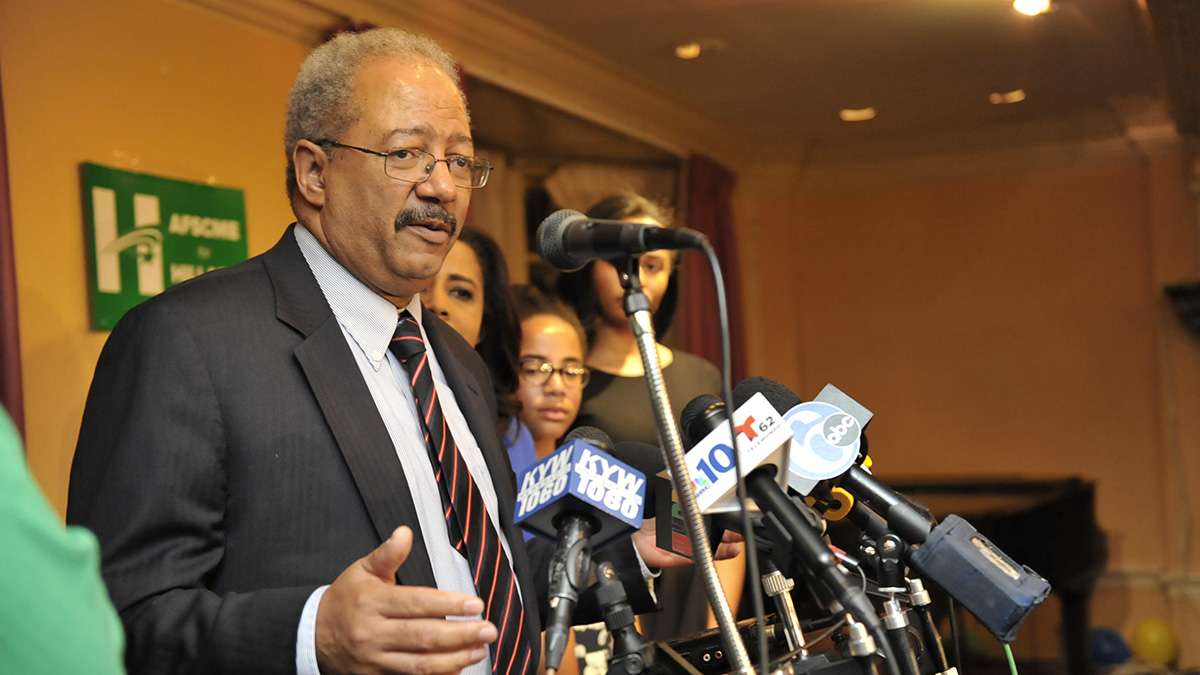Five things to learn from this election

Indicted U.S. Rep. Chakah Fattah couldn't hold on to enough support in the suburbs or the city of Philadelphia. (Jonathan Wilson for NewsWorks)
I learn something every time politicians do their thing and voters do theirs. Some thoughts about the 2016 Pennsylvania primary.
We — OK, I — underestimated Donald Trump again. He not only won Pennsylvania by a huuuge margin in the popular vote, he kicked butt in the strange, convoluted race for delegates in the state.As I’ve explained in earlier pieces, most of the Republican delegates in Pennsylvania are selected directly by voters. They’re on the ballot under their own names, without any stated connection to a presidential candidate.It means a presidential campaign needs to be really organized and determined to tell its voters which delegates to vote for. While we don’t have final results, it appears the Trump campaign did that pretty well.One Republican veteran told me yesterday she got three robocalls, including one from Ivanka Trump.
Bernie Sanders isn’t backing off, slowing down, or changing his tone. Yes, he lost in Pennsylvania and three other states, and Hillary Clinton will want to pivot to the general election.But Sanders and his followers are pursuing transformative change in our notions of economic fairness and the relationship between money and political power in America.That kind of change isn’t limited to any election cycle, so it doesn’t really matter than he can’t win the Democratic nomination.The remaining primaries and the convention do offer platforms to nurture the growth of the movement. So The Bern will burn on.
Money really matters in politics. That’s not a revelation I know, but it was so striking to see U.S. Senate candidate Katie McGinty overcome Joe Sestak’s lead with an avalanche of advertising from the national groups that spent millions on her behalf.McGinty is an energetic candidate, but you could just see the Sestak campaign deflate as it was outspent by huge margins in the closing weeks of the race.When I saw Sestak weekend before last, I asked where his election night event would be. “We’ll just be at the headquarters, Dave,” he said. “I don’t have the money to hire a hall.”
Relationships matter in politics. Also not a revelation, but it seems Sestak was in a position to win the Democratic nomination for U.S. Senate if he’d just managed to mend fences with the party leaders he ticked off in 2010 by running against the Republican-turned-Democrat Arlen Specter.Sestak says he went to the leaders of the Democratic Senatorial Campaign Committee to make peace and seek their support.He says they wanted to staff his campaign and expected him to blindly obey any instructions they sent. That, he said, he just couldn’t do.I spoke to somebody on the other side of this who said, basically, “Look, Joe had six years to repair these relationships with party honchos, union leaders, and elected officials. What does it tell you that none of them would support him in this race?”I don’t know, but it cost him.
Ethics actually matter, too. Philadelphia Congressman Chaka Fattah ran for renomination despite his indictment on serious corruption charges, and a lot of people said his constituents would return him to office anyway.Didn’t happen.Fattah got just a little more than a third of the vote in yesterday’s primary, and here’s the interesting part: He didn’t just lose in the suburbs.In the redistricting after the last census, the legislature added most of Lower Merion to Fattah’s district. That meant he had a bunch of new suburban voters in this race who might be expected to judge him more harshly.But if you look at the returns in just the Philadelphia portion of the district, Fattah still pulled only about 37 percent.He’s entitled to a presumption of innocence, but the fact that he never gave a real explanation for the charges in the indictment hurt him, even with voters who’d routinely re-elected him for 20 years.
WHYY is your source for fact-based, in-depth journalism and information. As a nonprofit organization, we rely on financial support from readers like you. Please give today.


